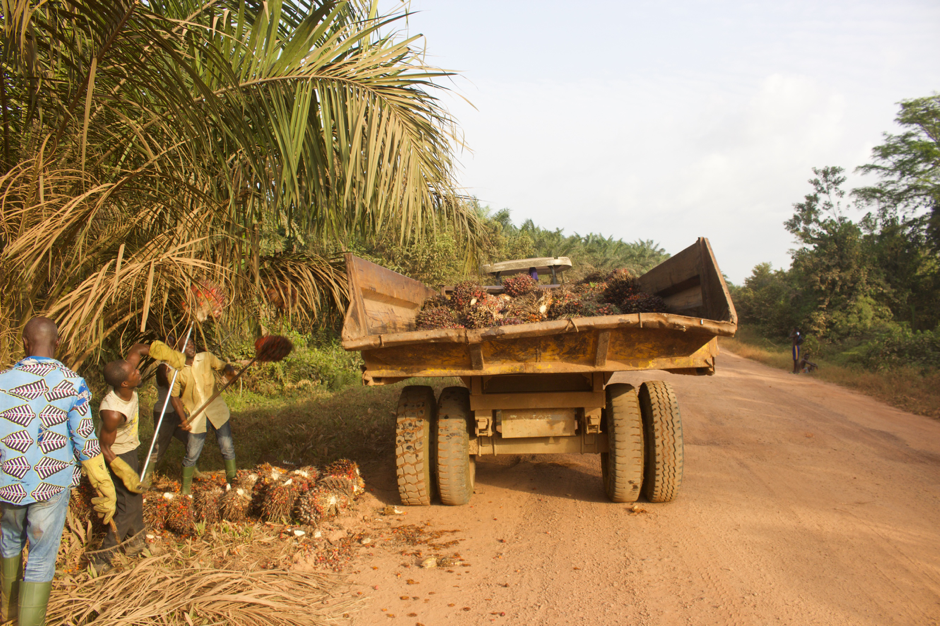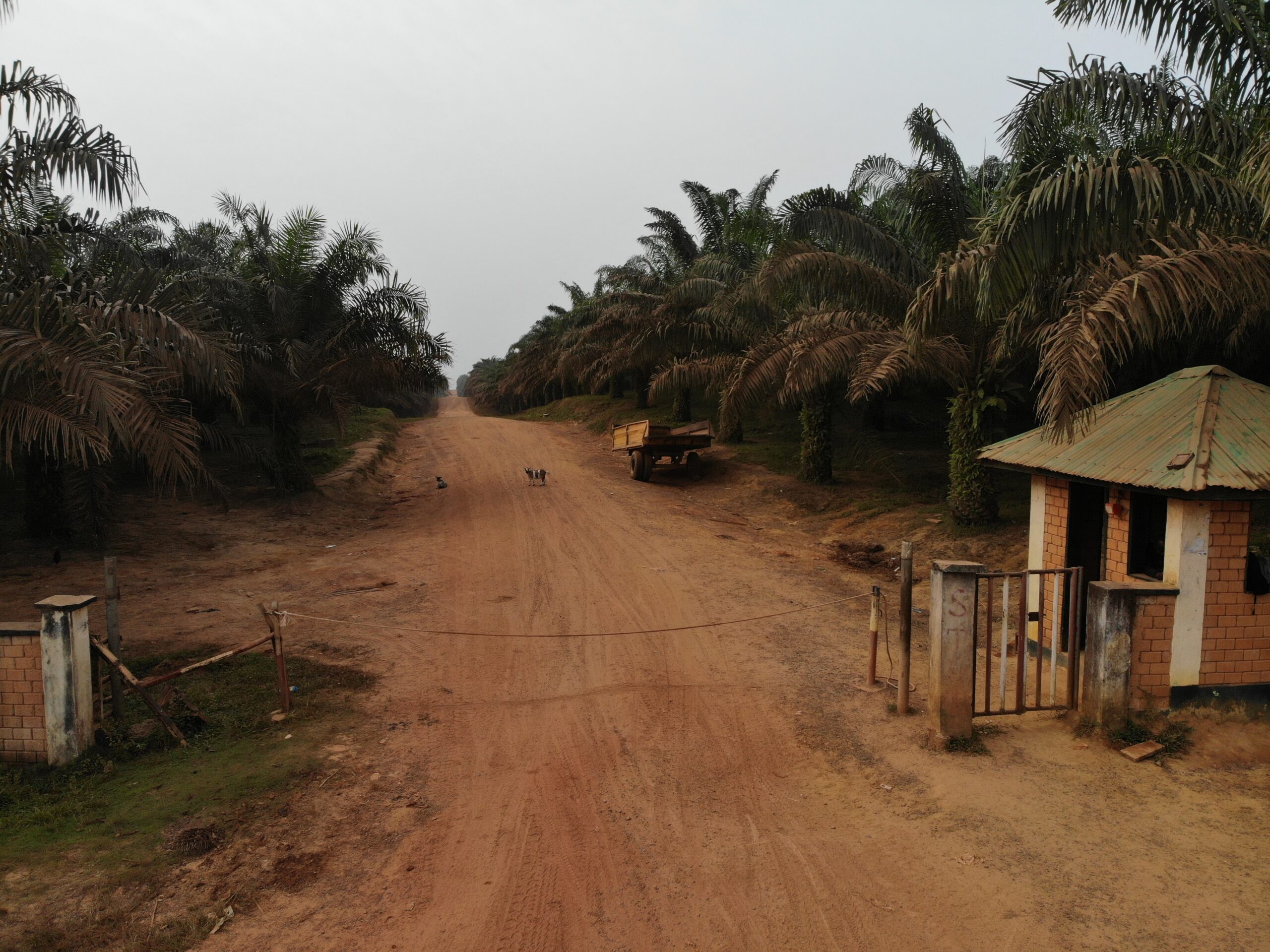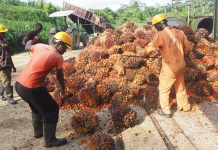Top: The entrance of the headquarters of Maryland Oil Palm Plantation (MOPP) in Pleebo Sodoken District. The DayLight/James Harding Giahyue
By Mark B. Newa
MONROVIA – The Maryland Oil Palm Plantation (MOPP) is involved in bad labor practices, land-grabbing and pollution, a new report by the nongovernmental organization the Sustainable Development Institute (SDI) alleges. It accuses MOPP of wiping out local communities’ livelihood in violation of Liberian laws.
The “Social and Environmental Impacts of Maryland Oil Palm Plantation in Liberia” report alleges the company of abusing the rights of locals to their land, and pushing them into poverty by polluting water sources and reneging on its concession obligations to develop their farms or smallholders program.
“Today, we bring you compelling revelations… an open disregard of the rights and dignity of local communities affected by MOPP,” James Otto, a lead campaigner at SDI, told a press conference marking the launch of the report.
“The SDI has worked to bring… issues impacting communities and environment, blatant violations of our laws and lack of respect for local communities on whose land whose land and resources company operates in our country,” Otto added.
SDI said it interviewed 23 people placed in 10 groups from seven communities for the report. It also interviewed the head of the local office of the EPA and local authorities, and photographs relevant places with global positioning system (GPS) coordinates.
MOPP did not answer queries for comments.
MOPP signed its concession agreement with the Liberian government in 2011 for covering 15,200 hectares of land in Maryland County and Grand Kru and worth US$230 million over the 25-year period. Owned by the Ivorian SIFCA Group, MOPP took over the ruins of Decoris Oil Palm Company, also based in the Ivory Coast after the end of the Liberia civil wars.
Following in Decoris’ footsteps, MOPP with the aid of armed police, cleared communities’ lands, destroyed their ancestral graveyards dishonored traditional shrines and sacred sites, leading to riots.
Land-grab
MOPP abused communities’ rights to their ancestral land, the report says. The company did not get the consent of of local communities—including some that legally documents—before developing its plantation. It accuses the company of illegally including 6,400 acres of land on which it is obligated to develop farms for villagers, and that the company has no individual agreements with communities.
Findings of the report are similar to a 2015 report by the Social Entrepreneur for Sustainable Development (SESDev) and Forest Peoples Programme.
“Communities have the right to a formal and legally binding agreement with the company on the use of their lands,” Otto said. “MOPP urgently needs to start negotiating and listening to communities agree on terms and conditions of a lease, provide loss and damages and give back land to communities where requested.”
“If the employee or contractor is sick or even if he/she is hurt at work it will be noted as an ‘absence’ and the day salary is not paid – or employees receive only half of their due payment,” according to the report.
Criminalization
Citing unnamed sources, the report alleges that MOPP harasses and intimated citizens.
One woman said MOPP security guards arrested and beat her daughter who they accused of stealing palm nuts. The woman said “I had to pay L$3,000 to the MOPP security to free her.” Her comments are backed by a civil society actor.
The report narrates an account of a local named Saturday Wilson, who it says has been frequently intimidated by MOPP for over a decade for a farmland in Gewloken, the town closest to MOPP’s headquarters.
“I am being threatened again and again repeatedly for the small piece of land owned by my family on which I planted palm. MOPP still wants to use the LLA agents and the court to take it away from me. As I speak, they are still after me.
Labor Issues
MOPP pays it contractors below the minimum wage (US$5.50 per day), cutting some contractors’ wages when they are sick or injured, the report alleges. The company does not permanently employ contractors even after three years.
“Contractors receive no payment for the day if production goals are not met. Production goals include the number of palms cleared of weeds as well as harvest volumes,” it says.

Pollution
The report accuses MOPP of planting in swamps, a breach of its environmental and social impact assessment (ESIA), the Environmental Protection and Management Law of Liberia, and principle of the Roundtable on Sustainable Palm Oil, the global watchdog for the commodity industry.
MOPP’s mill waste and fertilizers are seeping into creeks used by locals for drinking water, it says, citing several locals.
“They planted palms in all the swamps around here. And when the palm started growing, they used to apply fertilizers and it really used to affect our water,” one says.
And another, “They are still dumping the palm butter in the Swanpken river and people downstream are finding it difficult to use the water now.”
In 2017, the Environmental Protection Agency (EPA) fined MOPP US$10,000 for importing several chemicals into the country without acquiring the requisite approval from the agency.
Livelihoods
Communities told SDI researchers that their livelihoods have been heavily compromised due to pollution, forest degradation and a shortage of land, according to the report.
As the result, farmers have no access to herbs and firewood, forest to hunt, and waterfronts to fish, it says, adding grass the company had planted to control weeds are destroying their crops.
“Reduced access to farmland increases food insecurity and less cash crops to support family incomes. Villages literally find the oil palms on their doorsteps. They have no living space or only degraded or poor areas where they can try and provide for their families,” the report added.
“The little farmland that we secured is no longer good because we have used it over and over again,” one farmer says in the report.
The report calls on MOPP to halt its expansion until it signs memoranda of understanding with communities, pays compensation for land-grab, completes the development of the mandatory smallholders’ program.
MOPP did not reply a set of questions from The DayLight on the issues raised in the report. The company did not respond to follow-up emails.




